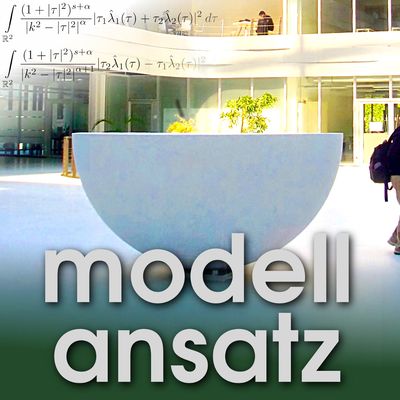Bei genauem Hinsehen finden wir die Naturwissenschaft und besonders Mathematik überall in unserem Leben, vom Wasserhahn über die automatischen Temporegelungen an Autobahnen, in der Medizintechnik bis hin zum Mobiltelefon. Woran die Forscher, Absolventen und Lehrenden in Karlsruhe gerade tüfteln, erfahren wir hier aus erster Hand.
http://modellansatz.de/
Cancer Research
Gudrun talks with Changjing Zhuge. He is a guest in the group of Lennart Hilbert and works at the College of applied sciences and the Beijing Institute for Scientific and Engineering Computing (BISEC) at the Beijing University of Technology.
He is a mathematician who is interested in system biology. In some cases he studies delay differential equations or systems of ordinary differential equations to characterize processes and interactions in the context of cancer research.
The inbuilt delays originate e.g. from the modeling of hematopoietic stem cell populations. Hematopoietic stem cells give rise to other blood cells. Chemotherapy is frequently accompanied by unwished for side effects to the blood cell production due to the character of the drugs used. Often the production of white blood cells is hindered, which is called neutropenia. In an effort to circumvent that, together with chemotherapy, one treats the patient with granulocyte colony stimulating factor (G-CSF).
To examine the effects of the typical periodic chemotherapy in generating neutropenia, and the corresponding response of this system to given to G-CSF Changjing and his colleagues studied relatively simple but physiologically realistic mathematical models for the hematopoietic stem cells. And these models are potential for modeling of other stem-like biosystems such as cancers.
The delay in the system is related to the platelet maturation time and the differentiation rate from hematopoietic stem cells into the platelet cell.
Changjing did his Bachelor in Mathematics at the Beijing University of Technology (2008) and continued with a PhD-program in Mathematics at the Zhou-Peiyuan Center for Applied Mathematics, Tsinghua University, China. He finished his PhD in 2014. During his time as PhD student he also worked for one year in Michael C Mackey's Lab at the Centre for Applied Mathematics in Bioscience and Medicine of the McGill University in Montreal (Canada).
References- C. Zhuge, M.C. Mackey, J. Lei: Origins of oscillation patterns in cyclical thrombocytopeniaJournal of Theoretical Biology 462,432-445, 2019.
- C. Zhuge, X. Sun, J. Lei: On positive solutions and the Omega limit set for a class of delay differential equations. Discrete and Continuous Dynamical Systems - Series B, 18(9), 2487~2503, 2013.
- C. Zhuge, M.C. Mackey, J. Lei: Neutrophil dynamics in response to chemotherapy and G-CSF Journal of Theoretical Biology 293, 111-120 2012.
- L. Hilbert, G. Thäter: Zellkerne, Gespräch im Modellansatz Podcast, Folge 206, Fakultät für Mathematik, Karlsruher Institut für Technologie (KIT), 2019.
- M. Gonciarz, G. Thäter: Portrait of Science, Gespräch im Modellansatz Podcast, Folge 197, Fakultät für Mathematik, Karlsruher Institut für Technologie (KIT), 2019.
- G. Thäter, K. Page: Embryonic Patterns, Gespräch im Modellansatz Podcast, Folge 161, Fakultät für Mathematik, Karlsruher Institut für Technologie (KIT), 2018.
- L. Adlung, G. Thäter, S. Ritterbusch: Systembiologie, Gespräch im Modellansatz Podcast, Folge 39, Fakultät für Mathematik, Karlsruher Institut für Technologie (KIT), 2016.
- Omega Tau-Podcast 072: Forschung in der Zellbiologie, 2011.
- J. Schmoranze, I. Wessolowski: Beim Herrn der Mikroskope – AMBIO Core Facility, Sciencekompass Podcast, Episode 009 B, 2017.
